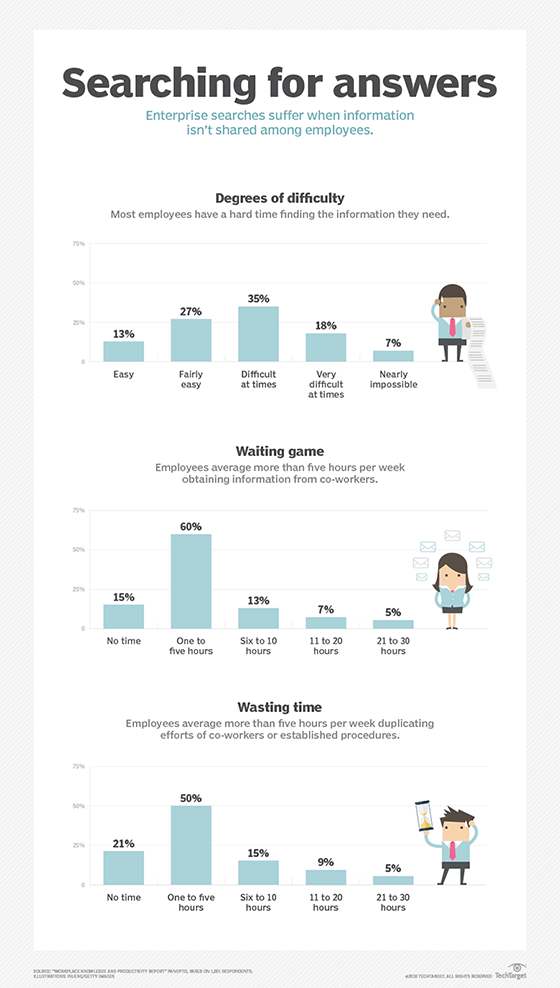
AI for knowledge management boosts information accessibility
Integrating AI for knowledge management systems builds intelligent searches. Enterprises benefit from streamlined, smart content platforms that make information accessible.
Enterprises using knowledge management solutions to capture, store and retain knowledge for their employees and customers are challenged by low adoption and limited capabilities of current offerings, such as intranets or wikis. These systems lack intelligent search and natural language capabilities and frequently have outdated material.
Adding AI for knowledge management solutions can help employees easily find and use relevant information, get instant answers to questions, improve real-time decision-making and accelerate response time to customers. Knowledge management solutions with machine learning capabilities are aiding enterprises in their ability to track processes, workflows, documents and data to monitor and improve how content is utilized in the enterprise.
Intelligent searches
Companies constantly generate information and knowledge from a variety of sources throughout the organization. Marketing and sales generate proposals, marketing content, customer and competitor insight, and presentation materials that need sharing. HR and internal operations create important internal process, policy and compliance documents. A lot of created content is incredibly useful for the enterprise but also highly volatile in terms of its validity because documents quickly get out of date as processes and information change in the enterprise. The larger an organization gets, the harder it is to access knowledge within the company; content gets obsolete quickly, and employees can make copies and version documents in ways that make them difficult to track. Machine learning and AI are helping to address these challenges by making content more easily locatable, consistently versioned and shareable.

AI-enabled programs for knowledge management systems give enterprises the power to perform natural language searches of knowledge content and surface information in order to optimize identification of appropriate content. Similarly, machine learning is being used to automatically identify content that is obsolete and give guidance to content producers and consumers on how to update information for renewed relevancy.
Natural language processing (NLP) in knowledge management systems is also enabling companies to have more intelligent search features. Keyword searches work for simple queries, but once questions get more complex, a new level of machine intelligence is required. The U.S. Patent and Trademark Office receives hundreds of thousands of applications each year, and searching for similar patents can be a challenge. Traditional keyword searches were proving ineffective. With the help of AI, patent officers can use smart search features to help examiners find and analyze patent and trademark applications, resulting in faster searching for documents needed to review submissions.
Knowledge consumption through chat
To improve overall consumption value from knowledge, companies have found that integrating AI-powered knowledge systems into apps employees already use -- such as Slack or Microsoft Teams -- brings about much wider successful adoption. Over time, these systems continue to gain intelligence and become even more useful as they learn from experiences. AI-enabled chatbots can integrate directly into the conversation stream, providing access to knowledge management from within the collaborative experience.
AI-powered knowledge chatbots are internally helping organizations better consume knowledge by making interactions with the knowledge bases more conversational. Traditionally, if employees wanted to find information about a company policy or access internal training documents, they needed to directly contact an HR representative. This process is manual, time-consuming and often doesn't result in an immediate response. With the help of intelligent knowledge management tools connected through messaging systems, employees can simply message a question through Slack and instantly receive the information.
Additionally, workers need content from a wide range of locations and sources, such as external, internal, paid and free sites, which poses the challenge of consistent content access. Many companies have no unified discovery of information, and access to some content can be behind paywalls. NLP systems can ingest and understand nearly unlimited amounts of content without needing humans to do the work of classification. Using AI to create the categorization and understanding that enables discovery with the ability to handle both structured and unstructured content -- such as email, invoices, purchase orders or images -- is proving powerful to enterprise communication management.
The need for knowledge within organizations is only going to continue to grow, and the speed at which knowledge is obtained will grow rapidly. For forward-thinking companies that want to make their library of knowledge more accessible to all employees, the adoption of AI for knowledge management will help companies make their employees more productive.








